CASE REVIEW: Erick Buhr guilty of second-degree murder of grandmother Viola Erb
Erick Buhr was found guilty of the second-degree murder of his grandmother a little more than two years after Viola Erb was found dead in her home near Baden.
The verdict was the culmination of a three-and-a-half-week trial, held at the Region of Waterloo courthouse.
Jurors heard testimony and evidence, including from Erick Buhr himself, who not only took the stand in his own defense, but ended up giving his own closing address to the jury after unsuccessfully applying for a mistrial.
Viola Erb was 88-years-old at the time of her death and she was one of the co-founders of trucking company Erb Transport.
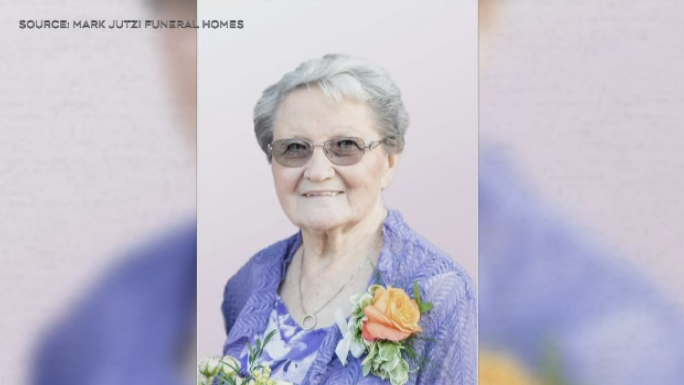 Viola Erb. (Mark Jutzi Funeral Home)
Viola Erb. (Mark Jutzi Funeral Home)
On Sept. 25, 2022, she was found bleeding on the kitchen floor of her Sandhills Road home.
Her grandson Erick Buhr, who lived with her, was the one who called 911.
Court case
Court heard a recording of that call.
“My grandma’s been murdered,” Buhr told the dispatcher.
When emergency responders arrived, paramedics said Erb had a weak pulse and they attempted life saving efforts. Erb, however, was pronounced deceased not long afterwards.
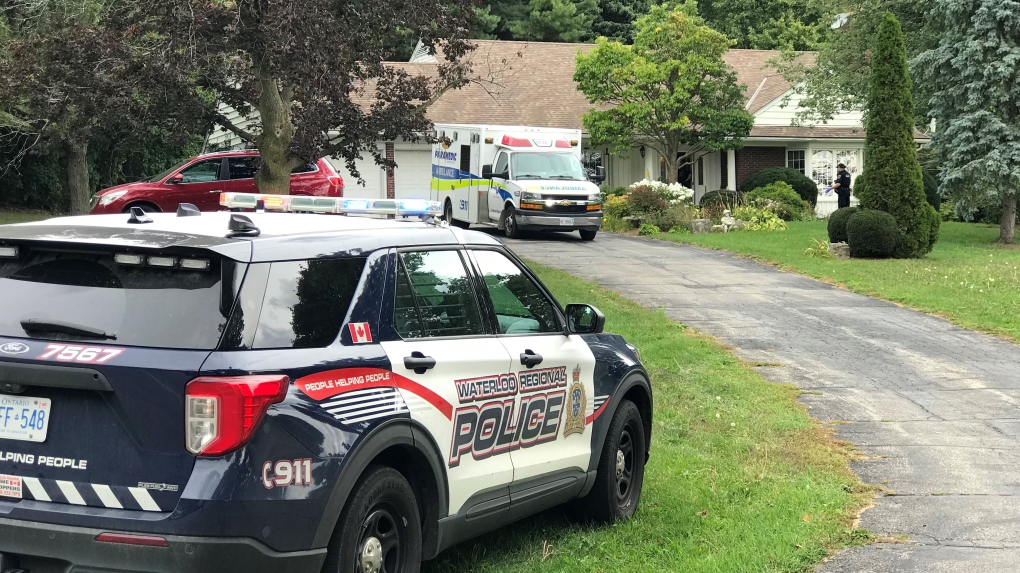 Emergency services respond to a home on Sandhills Road on Saturday Sept. 24, 2022. (Dan Lauckner/CTV Kitchener)
Emergency services respond to a home on Sandhills Road on Saturday Sept. 24, 2022. (Dan Lauckner/CTV Kitchener)
The cause of death was later determined to be external neck compression and blunt force trauma to the head.
Police body camera footage of the emergency response was played in court, showing Buhr speaking with officers in the aftermath of Erb’s death. He told an officer he had not changed his clothes before emergency crews arrived.
Jurors heard police later found jeans, a t-shirt and socks with blood on them in Buhr’s bedroom.
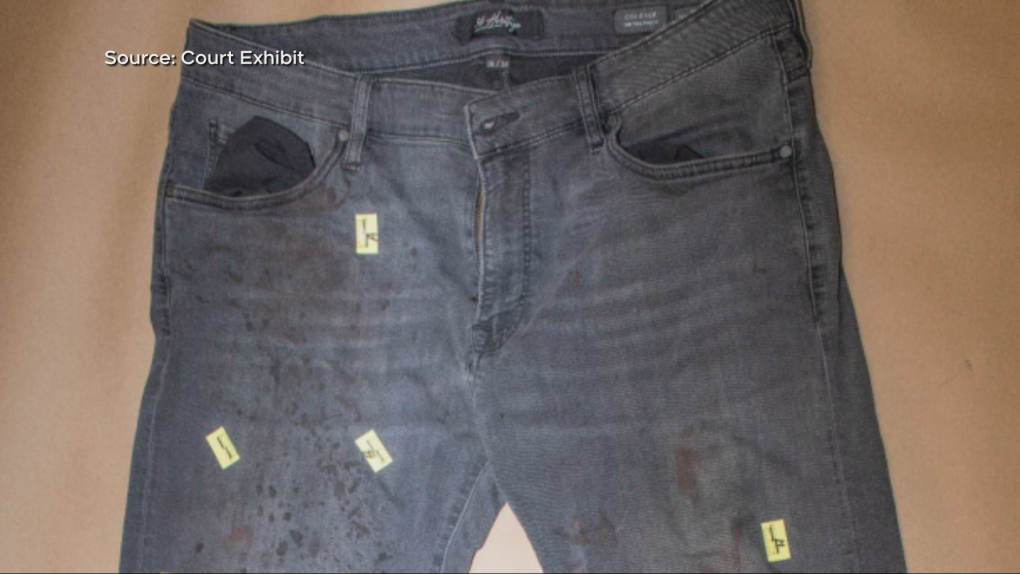 Jeans found at Erick Buhr's home after his grandmother's fatal attack. (Court exhibit)
Jeans found at Erick Buhr's home after his grandmother's fatal attack. (Court exhibit)
At the time of the attack, Buhr was on house arrest and wearing an ankle monitor that recorded his location every minute.
That GPS data indicated he was in, or near, the house in the minutes leading up to the 911 call.
When Buhr took the stand in his own defense, he contended the GPS was inaccurate.
He testified he had been in a forested area behind the house, sitting on a log and smoking cocaine, before he went inside and found his grandmother badly injured.
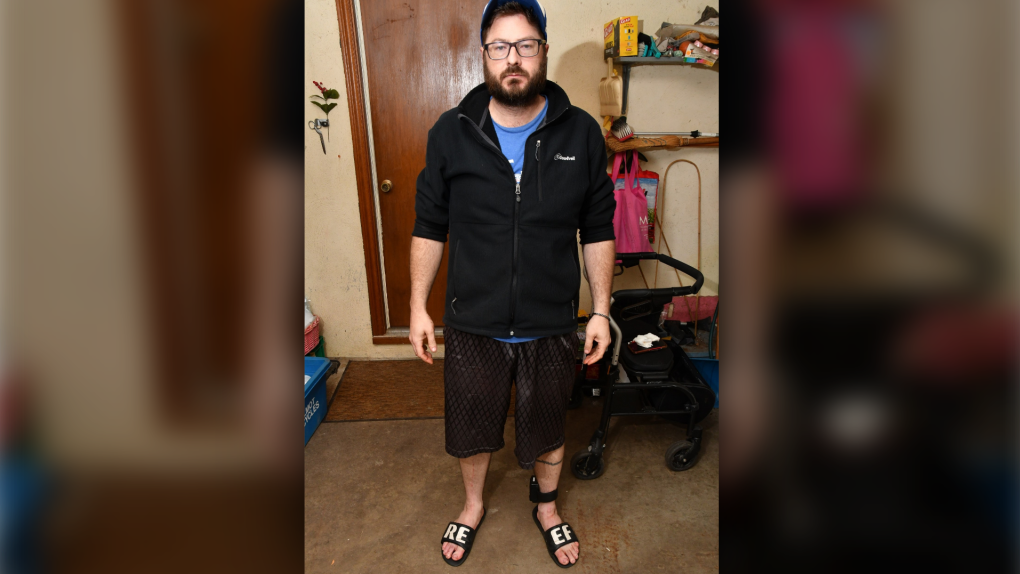 Erick Buhr in a photograph taken by Waterloo Regional Police on Sept. 24, 2022. (Court exhibit)
Erick Buhr in a photograph taken by Waterloo Regional Police on Sept. 24, 2022. (Court exhibit)
Buhr admitted he lied to police multiple times when he said he had not changed his clothes before they arrived, but said that was the only thing he lied about.
During cross-examination, the Crown pointed out numerous inconsistencies in Buhr’s story. Buhr often replied that he couldn’t remember exactly the order things happened that day.
The Crown also compared the body camera footage showing Buhr’s location to the GPS data taken from the ankle monitor.
“It follows quite accurately your movements as we are aware of them on the body cam,” prosecutor Simon McNaughton argued. “When all I have is your word, suddenly it’s wildly inaccurate.”
Buhr requests a mistrial
After the defense closed its case, in a surprise turn of events, Buhr fired his lawyer and requested a mistrial.
He claimed his lawyer had not told him the Crown had his cellphone records or there was body camera footage from the emergency responders that would be used in court.
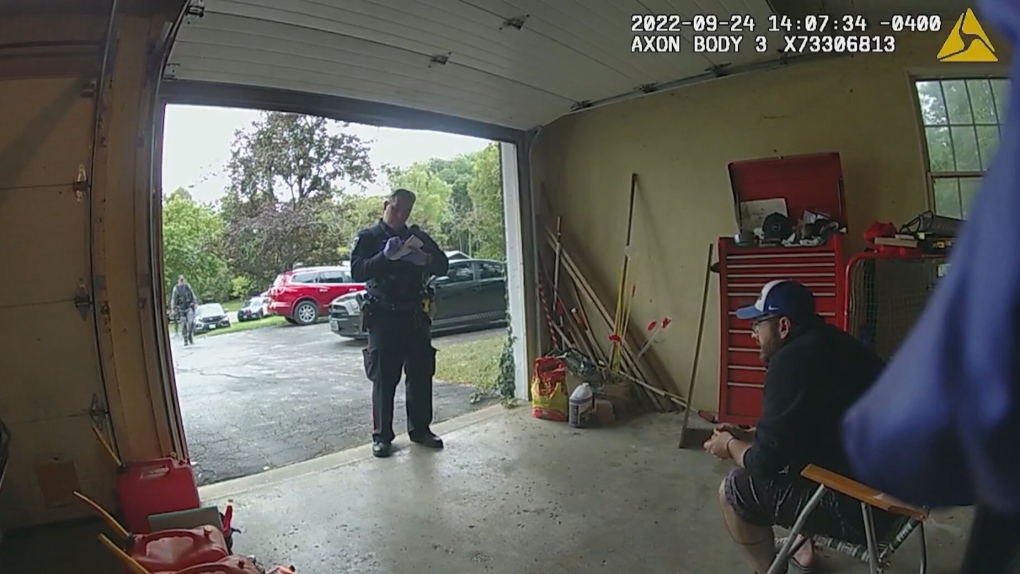
The judge did not declare a mistrial, calling it a “remedy of last resort,” and noted it would likely lead to a trial delay of a year or more.
Buhr pressed the judge, arguing his rights had been violated.
"I presented a lot of information and evidence that should explain why a mistrial should happen,” he said.
"I’m not going to argue with you, sir,” Justice Gerry Taylor replied. “You didn’t present any evidence. You made a bunch of allegations.”
Buhr was given a few days to prepare his own closing address.
Closing arguments
Buhr asked the jury to find him not guilty, ending his speech with: “If the GPS don’t fit, you must acquit.”
In the Crown’s closing, prosecutor Jennifer Caskie said Buhr was at the location of the murder at the time it was committed, he knew details that the murderer would know and wore the murderer’s clothes.
Caskie also called the GPS data “reliable evidence,” saying it is inexplicable that the GPS would became inaccurate during the exact time period when Buhr needed an alibi.”
"The GPS, in this case, does fit, so you cannot acquit," Caskie countered.
Buhr’s verdict
Justice Gerry Taylor, during his instructions, told jurors they had two options for a verdict: guilty of second-degree murder or not guilty.
Taylor said, based on the extent of Erb’s injuries, it can only be concluded that whoever attacked her must have intended to kill her or meant to cause bodily harm they knew was likely to cause her death.
The jury returned after only a couple of hours with their verdict, finding Buhr guilty of second-degree murder.
The conviction comes with an automatic life sentence, though it will be up to the judge to determine how many years Buhr will serve before he can apply for parole. The expected range is between 10 and 25 years.
Buhr will be back in court on Jan. 27, 2025 for sentencing submissions. He has told the court he intends to continue representing himself in this case.
CTVNews.ca Top Stories

'Why would I box myself in?': Singh on why he won't commit to helping bring Trudeau's gov't down, yet
NDP Leader Jagmeet Singh says U.S. president-elect Donald Trump's looming tariff threat is part of the reason why he's not committing to voting non-confidence in Prime Minister Justin Trudeau's government.
Donald Trump says Canada becoming 51st U.S. state is 'a great idea.' Jean Charest calls the comment a 'wake-up call'
U.S. President-elect Donald Trump is taking aim at Canada once more, saying it would be 'a great idea' to make it America's ‘51st state.'
'It's a giant mess': Confusion remains about the GST/HST holiday
The organization representing small and medium size businesses in Canada says the start to the GST and HST holiday has been 'a giant mess.'
B.C. man drops camera into ocean, accidentally captures 'breathtaking' whale video
Before it turned into an extraordinary day, Peter Mieras says it began being quite ordinary.
'You're either with Beijing or you're with Washington': Ford says to Mexico in CNN interview
Ontario Premier Doug Ford has a message for Mexico as the threat of tariffs by incoming president Donald Trump hangs over both sides of the U.S. border.
Oldest stone tablet inscribed with Bible's Ten Commandments sells for US$5 million
The oldest known tablet inscribed with the Ten Commandments from the Old Testament sold on Wednesday for US$5.04 million, more than double its high estimate.
What's the best treatment for ADHD? Large new study offers clues
Stimulant medications and certain therapies are more effective in treating ADHD symptoms than placebos, a new study on more than 14,000 adults has found.
NEW Here's how the cost of living challenges are shaking up Canadian seniors' retirement plans
With the high cost of living increasingly a concern, some seniors are making sacrifices to help their adult children and grandchildren make ends meet. Here are some of their stories.
There are 88 new Order of Canada appointees. Here's a look at some of the most notable names
Ryan Reynolds, Scott Oake and Maureen Ann Jennings are among the 88 new recipients of the Order of Canada.

































